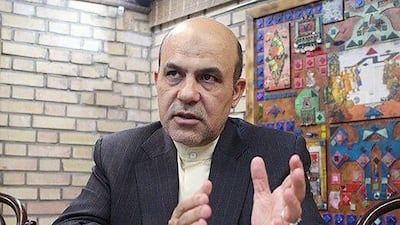The UK government has condemned Iran's intention to execute British-Iranian dual citizen Ali Reza Akbari.
The former Iranian senior defence official has reportedly been charged with spying for British intelligence and Foreign Secretary James Cleverly has urged authorities to halt his execution.
Mr Akbari left Iran after stepping down as deputy defence minister in 2001 and settled in the UK, where he became a naturalised citizen. It is believed he was arrested in 2019 in Iran.
His family and British officials decided against publicising his case at the time in the hope he would be released on an internal appeal.
However, he was reportedly told three months ago his final appeal had been rejected. He was placed in solitary confinement 48 hours ago and informed his execution was imminent.
“Iran must halt the execution of British-Iranian national Ali Reza Akbari and immediately release him,” Mr Cleverly tweeted.
“This is a politically motivated act by a barbaric regime that has total disregard for human life.”
Mr Akbari is a former Iranian deputy defence minister who was arrested in 2019 and accused of passing information to MI6, the British intelligence agency, on past nuclear talks between Iran and western nations, reports say.
He has denied the charge and said he was tortured and forced to confess on camera to crimes he did not commit, BBC Persian reported.
Mr Akbari's wife Maryam said she was invited to a “final meeting” at the prison where he has been put in solitary confinement, an apparent sign that an execution is imminent.
Ms Akbari, who lives in London, told The Guardian she was fearful her husband would be executed within the next 24 hours.
“He is entirely innocent and the victim of political games inside the country,” she said.
“There is no evidence that he was a spy except a confession that was extracted after he was drugged and interrogated for 3,500 hours. He loves his country, but this is part of a political power game inside Tehran. His only contacts with British officials were those permitted by his official status.”
House of Commons foreign affairs committee chairwoman Alicia Kearns accused the Iranians of seeking to use dual citizens as weapons while anti-government protests shake the country.
“It is another horrifying example of the Iranian regime — because they feel they are cornered, because there is such significant pressure from sanctions — weaponising British nationals and industrialising hostage-taking,” Ms Kearns told BBC Radio 4.
She said Mr Akbari might have been singled out by the regime because of his closeness to a leading Iranian moderate who has led calls for dialogue.
Nazanin Zaghari-Ratcliffe — in pictures
“I wonder if this is an effort to undermine that individual," Ms Kearns said.
"It is also a chance for the Iranians to reiterate their narrative that the British government, the American government, are trying to undermine the regime and overthrow the Iranian regime,” she said.
Ms Kearns said western countries should respond with new sanctions to recent executions of anti-government protesters.
“Every time the Iranian government assassinates an individual involved in the protests, there should be sanctions applied by western governments the next day to make the point that we stand by those protesting for the basic rights of Iranians — otherwise we are showing no meaningful support to them,” she said.
Amnesty International called the reports of Mr Akbari’s death sentence “distressing and deeply concerning” and urged the government to do more to prevent the execution.
“There’s a long-standing pattern of British-Iranians being arrested, mistreated and arbitrarily jailed by the Iranian authorities, in cases sometimes amounting to state hostage-taking," said Freshta Sharif, Amnesty International UK’s campaign manager.
"But an execution would represent a terrifying intensification of this process of using foreign nationals as diplomatic pawns."
Ms Sharif said the UK had “a weak record when it comes to lobbying for the release of arbitrarily jailed Britons in Iran”.
“Ministers must be able to show they have a clear plan for ensuring the threat of execution is lifted from Ali Reza and that allegations he was tortured and forced to falsely confess are fully investigated,” she said.
Tehran has detained a number of dual and foreign citizens in recent years, including British-Iranian national Nazanin Zaghari-Ratcliffe, who was held in 2016 and released last year.
For several years, Iran has been locked in a shadow war with the US and Israel, marked by covert attacks on its disputed nuclear programme.
Nazanin Zaghari-Ratcliffe and Anoosheh Ashoori released — in pictures
The killing of Iran’s top nuclear scientist in 2020, which Iran blamed on Israel, indicated foreign intelligence services had made major inroads.
Authorities have not released any details about Mr Akbari's trial.
Those accused of espionage and other crimes related to national security are usually tried behind closed doors, where rights groups say they do not choose their own lawyers and are not allowed to see evidence against them.
News agency Tasnim said the Supreme Court upheld Mr Akbari's sentence and that he had access to a lawyer.
He led the implementation of a 1988 ceasefire between Iran and Iraq after their eight-year war, working closely with UN observers.


























